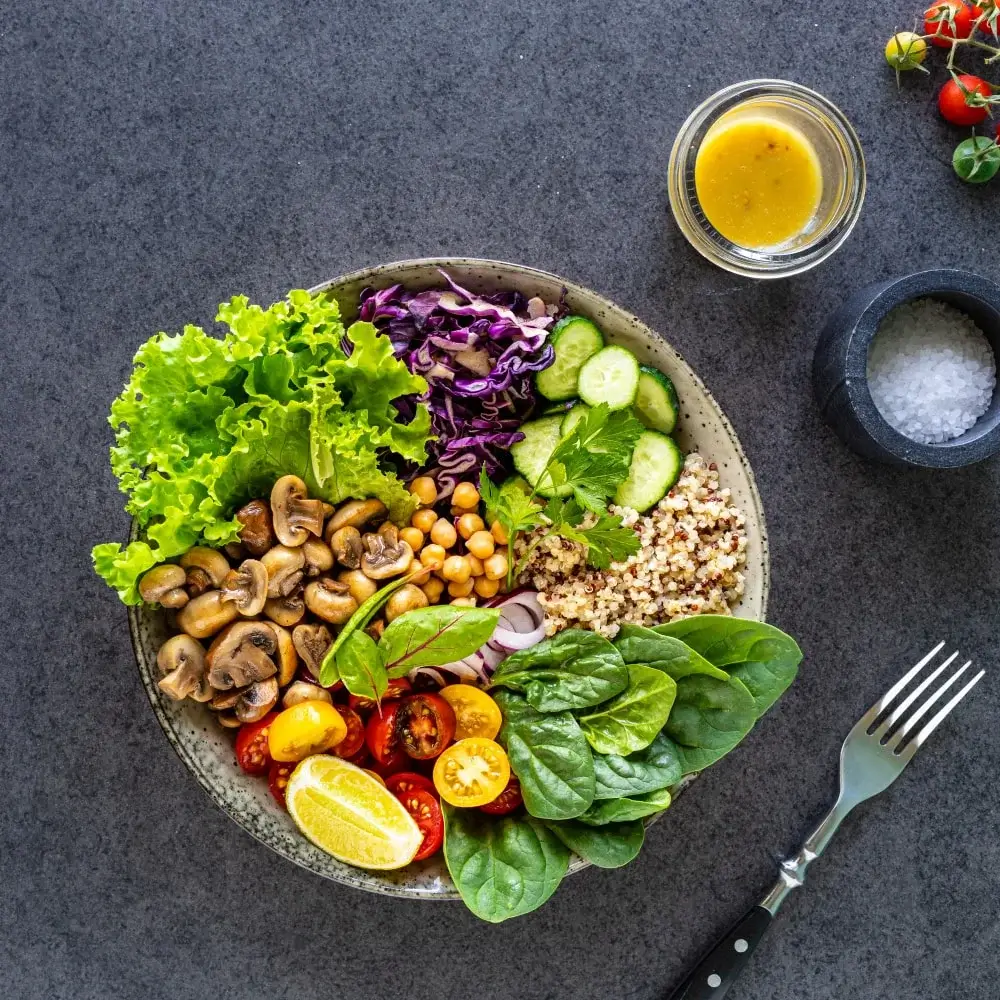Living in the modern fast-paced world, productivity and overall well-being depend on energy. This energy to help us make it through the day is partly derived from the foods we consume. Understanding what type of healthy food to include in daily diet intake can help significantly in not only boosting physical but also mental performance.
The Significance of Daily Energy
It’s energy that provides the ground for whatever we do. From simple walking to exercises and concentrating on our work, everything that keeps our bodies running is just energy itself. But again, the big question is, where does this energy come from? And, of course, if healthy foods are taken, there is no problem in keeping up the stamina and vitality in the body.

Role of Macronutrients
As for the relation between food and energy, three significant macronutrients are to be observed: carbohydrates, proteins, and fats. These chemicals have different functions in energy production.
Carbohydrates: The Primary Source of Fuel
Carbohydrates are generally recognized as the source of energy for the body. They break down to glucose, which feeds cells, tissues, and organs. Healthy foods containing complex carbohydrates, like whole grains, fruits, and vegetables, result in a release of energy slowly upon ingestion.
• Whole grains – Quinoa, brown rice, oats – are excellent sources of complex carbohydrates. The high content of fiber makes the digestion process extremely slow and hence releases glucose into the bloodstream very gradually. This eliminates spikes and troughs of energy.
• Fruits: Fresh fruits, particularly bananas and apples, provide not only carbohydrates but also essential vitamins, minerals, and antioxidants. The natural sugars in them give a surge of energy without taking much time; hence, these fruits are very appropriate for snacking during the day.
Proteins: Building Blocks for Energy
Besides being an essential constituent for muscle restoration and development, proteins also contribute highly to the process of energy production. In an event when carbohydrate stores are very low, the human body has the ability to convert proteins into glucose through a process called gluconeogenesis.
• Lean Proteins: Chicken, turkey, fish, legumes, and tofu are good sources of lean protein. They build up body mass, which is important for overall metabolism and energy levels. Adding these healthy foods to meals can produce a constant energy supply.

Fats: The Long-Term Energy Reserve
Fats are one of the most misunderstood nutrient energy sources. Although high in calories, healthy fats are a very important part of energy storage systems and are required for a number of other critical body functions because they contain essential fatty acids that your body cannot synthesize.
• Healthy Fats: Avocados, nuts, seeds, and olive oil offer a rich source of monounsaturated and polyunsaturated fats that help promote heart health, ensuring that energy is released slowly from the body. Fats take much longer to metabolize compared to carbohydrates; thus, they are always considered a great source of energy for individuals who participate in endurance exercises.
Key Healthy Foods to Gain Energy Daily
The consumption of many healthy foods helps to ensure high levels of energy in your body. Some of the main key foods are:
Brown Rice
Whole grains are the foundation of a healthy diet. Brown rice, quinoa, barley, and oats are great sources of fiber, vitamins, and minerals. The complex carbohydrates will provide their energy quite slowly, which makes them perfect to eat for breakfast or as side dishes.
Fruits
Fresh fruits are nature’s own energizers. They are excellent sources of many nutrients and antioxidants. Their useful varieties include:
• Bananas: Rich in potassium and carbohydrates, bananas are the best source of energy boosters.
• Berries: Antioxidant-dense and high in fiber, berries support overall health and maintain energy production.
Vegetables
Being packed with nutrients, vegetables are to be part of each meal taken. Nutrient-rich leafy greens like spinach and kale contain a high level of iron, which is the oxygen carrier in the blood. Other popular cruciferous vegetables like broccoli and Brussels sprouts are equally rich in fiber and nutrients and support digestive health and energy production levels.
Nuts and Seeds
Nuts and seeds are energy-dense. They contain health-promoting fats, protein, and fibre, and therefore make great snacks. Almonds, walnuts, chia seeds, and flaxseeds also provide healthy energy, lower inflammation, and support brain health.
Lean Proteins
Incorporating lean proteins into your diet is highly important in order to help you maintain your energy levels. Foods like chicken, turkey, fish, beans, and lentils provide additional muscle mass and balance your blood sugars. Inclusion of such health-promoting food in the diet gives a reliable source of energy throughout the day.
Hydration: The Overlooked Source of Energy
While talking about healthy nutrition, it is impossible to avoid the issue of hydration. Water is crucial for energy production. When the organism is dehydrated, it feels overall weakness, lack of concentration, and decline in physical performance.
The Role of Water
Water contributes largely to most of the body functions, from digestion to the transportation of blood and regulation of body temperature. Adequate water helps a person not only maintain energy levels but also ensures the overall health of the individual. Drinking at least eight glasses of water per day can help, though one should adjust for the activity level and climate.
Effects of Dehydration
Even minor dehydration impairs energy. The common symptoms include lethargy, headaches, and lack of concentration. During the day, try to consume hydrating healthy foods such as fruits and vegetables with high water content like cucumbers, watermelon, and oranges.
Meal Timing for Energy
The times when meals are taken plays a substantial role in the kinds of energy levels one experiences in a day. Creating a pattern of eating frequently keeps blood sugar from dipping and experiencing those low points of energy.
Regular Patterns of Eating
Taking three balanced meals with two to three snacks around evenly spaced periods of time forces one into sustaining an even energy level. Incorporate in every meal a mix of all major macronutrients.
Timing meals in relation to exercise has a strong impact on energy levels and recovery. Consuming a carbohydrate-rich snack before exercise, such as a banana or a granola bar, helps to maximize energy stores and ensures that the body has the fuel it needs to perform at its best. This is especially true for endurance activities such as distance running or cycling. Post-exercise meals containing some protein, such as yogurt and fruit, supply the building blocks necessary to repair muscle tissue and replenish energy stores.
Energy and Macronutrients
While macronutrients provide the major share of energy, micronutrients—vitamins and minerals—areooming for energy metabolism. They enable food to be transformed into energy and also perform many roles related to other biochemical reactions.
Important Vitamins and Minerals
• ‘WINS: Thiamine (B1), riboflavin (B2), and pyridoxine (B6) basically belong to a category of vitamins that render their supports in the field of energy metabolism. They support the conversion of carbohydrates, fats, and proteins into usable energy.
• Iron: Iron plays an important role in carrying oxygen in the blood. If the body does not get sufficient iron, it can lead to fatigue and a feeling of low energy. Deficiencies can be avoided by incorporating iron-rich health foods like spinach, legumes, and lean meat.
Factors Affecting Energy
Besides diet, numerous factors can influence the level of energy. Understanding these factors can help an individual make the appropriate adjustment towards optimizing their energy levels every day.
Physical Activity
Regular exercises increase the amount of energy being expended but also serve to gradually heighten the energy levels over time. Physical activities improve blood flow, elevate mood, and generally promote sleep, which helps to increase energy levels.
Sleep
Enough sleep is highly instrumental in the restoration mechanisms of energy. Poor sleep results in fatigue and lowered cognitive ability. A regulated sleeping pattern and provision of a rest-conducive environment are part of the recommendations for optimum overall energy levels.
Chronic stress saps energy. The impact of stress may be reduced by the application of such practices as meditation, yoga, and deep breathing that permits one to manage energy in a more efficient way.
Conclusion Including several healthy foods into the diet is extremely important for maintaining one’s energy level throughout the whole day. Concentrating on whole grains, fruits, vegetables, nuts, lean proteins, and adequate hydration will help individuals feel better physically and mentally.
Understanding how nutrition and hydration, along with such related factors as lifestyle, are interconnected would empower these individuals to make a difference through choices that could secure a perpetual energy level throughout life, along with a general condition of well-being.
Of paramount importance, adopting such food habits means a guarantee of vitality and support of long-term health and productivity.






